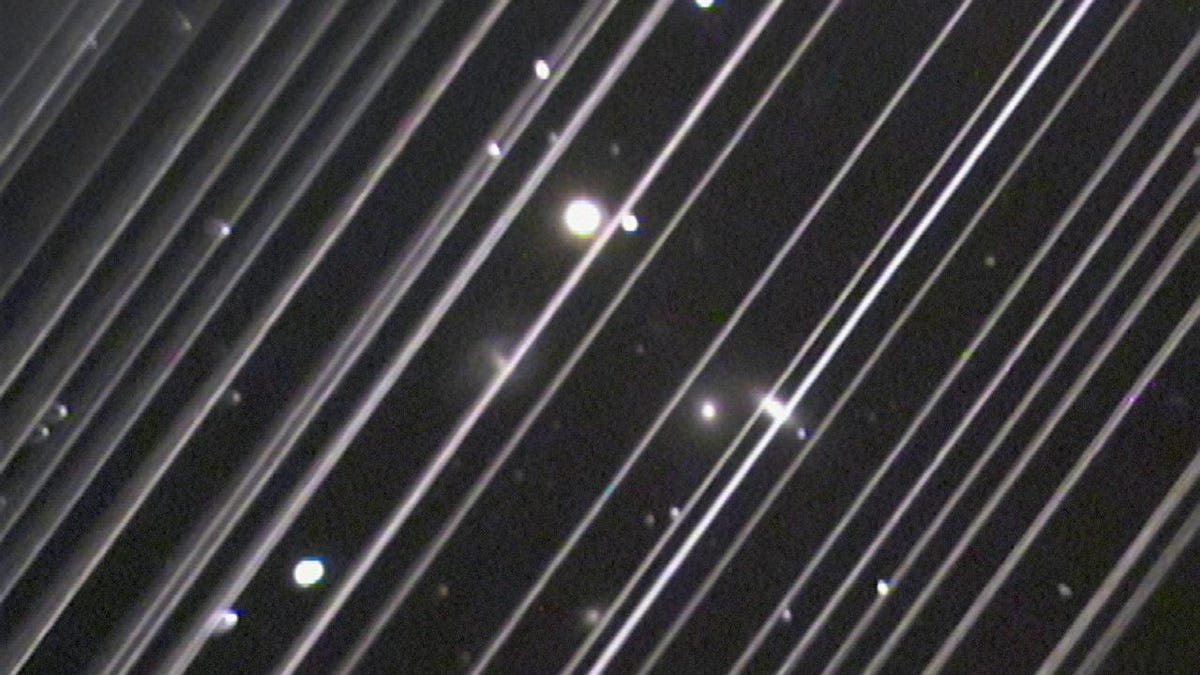Harvard astronomer says Starlink could affect hunt for near-Earth asteroids
SpaceX and other companies are looking to add thousands of satellites to the sky and astronomers are concerned.

This image of a distant galaxy group from Arizona's Lowell Observatory is marred by diagonal lines from the trails of Starlink satellites, shortly after their launch in May.
A well-known astronomer and satellite tracker says observatories that scan the sky for potentially hazardous asteroids could be impacted by SpaceX's plan to deploy over 12,000 satellites to low Earth orbit over the next several years.
Jonathan McDowell from the Harvard-Smithsonian Center for Astrophysics shared a draft of his new study that looks at the effects the Starlink broadband service mega-constellation could have on different observatories.
"Astronomers - and casual viewers of the night sky - must expect a future in which the low Earth orbit population includes tens of thousands of relatively large satellites," McDowell writes in the paper, which has been accepted for publication in Astrophysical Journal Letters.
The pre-print version posted online is a draft that has yet to undergo peer review.
Summary of paper:
— Jonathan McDowell (@planet4589) March 16, 2020
"How bad will it be? Well, it depends... but in some cases, not great."
A number of astronomers and astronomical organizations have expressed their concern that the growth of huge satellite constellations, led by Starlink's plan to deploy as many as 42,000 satellites over the long term, will interfere with scientific observations of space.
Almost immediately after SpaceX began launching the satellites in 2019, regular skywatchers and professional astronomers were astonished by the bright trains of light in twilight skies and in the fields of view of major telescopes.
Both the brightness and the sheer number of satellites -- from not just SpaceX, but also competitors like OneWeb -- pose a problem for astronomers. Many have pointed to observatories with particularly wide fields of view, like the upcoming Vera C. Rubin Observatory in Chile, as likely to be most impacted.
"However, there appear to be other science projects which may be more severely affected," McDowell writes. "For example, searches for near-Earth asteroids include observations taken in twilight, a time when the satellites are illuminated year-round."
McDowell modeled how many satellites out of a constellation of 12,000 (the FCC has already approved SpaceX for around this many satellites) would be lit up by the sun and above the horizon from three different latitudes on Earth in both summer and winter.
"We see that several hundred satellites are above the horizon at all times of night; during winter twilight, and all summer night long, most of them are illuminated."
SpaceX did not immediately respond to a request for comment.
CEO Elon Musk has said that the company will work with astronomers to make sure that Starlink has no impact on scientific discoveries. SpaceX has been working with different astronomical groups on possible solutions and different ways to modify the satellites to make them less reflective.
Meanwhile, though, the company continues to launch new batches of the orbiting data gateways every few weeks. A Falcon 9 rocket is set to carry 60 more to space on Wednesday.

